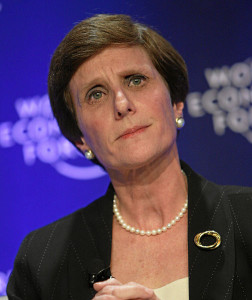Life is where we live when we aren’t traveling.
In my life as women’s historian and writer, I’m continually intrigued by the question of whether women’s professional careers are blocked a “glass ceiling” or any other impediments. The latest author to catch my eye on this subject is Alison Wolf, Professor of Public Sector Management at King’s College, London. Wolf’s recent book The XX Factor: How the Rise of Working Women Has Created a Far Less Equal World is raising as much discussion as Sheryl Sandberg’s Lean In: Women, Work, and the Will to Lead.
Since Wolf focuses on what she calls the “XX Factor,” we begin today’s blog with a nod to science. Specifically the Human “XY sex-determination system.” As explained in high school biology, there are two chromosomes that determine the physical sex of a fetus. Females have two X chromosomes. Males have one X and one Y chromosome.
On that basis, what do these five people have in common?





If you guessed these five women are females possessing XX chromosomes, you are correct.
What does it mean?
Can anyone with an XX chromosome be a captain of industry or leader of nations?
Not necessarily.
Wolf pushes against the continuing rhetoric that women remain hampered by the “Glass Ceiling.” According to Wolf, gender is not a dominant factor for female success in the modern developed world. The key lies in education and economic condition. Looking at data from numerous studies, Wolf concludes successful women have more in common with their equally high flying male colleagues than they do with the women to whom they outsource domestic care services – child care, cleaning, cooking, shopping, etc. These jobs are largely filled by women, and generally don’t pay well.
Wolf states the XX Factor applies to about 15 percent of women who pour all their energies into their professions, leaving other women to their own devices. The XX Woman comes across as a person driven by ambition. She reaches the top of her profession, because that’s where she wants to be. She doesn’t necessarily want to “have it all” – whatever that phrase is supposed to mean. On the other hand, she may be as active as any full-time mother in one-on-one time with her child or (generally no more than two) children. The XX Woman is a consummate professional in her chosen field.
Juxtapose that image with advice Ursula Burns recently gave to ambitious young women (http://blogs.wsj.com/atwork/2013/03/20/xerox-ceo-ursula-burns-has-advice-for-ambitious-women/)
• Find a good husband – who may be older. Burns’ husband is twenty years her senior. He keeps the children and home on track.
• Redefine the work-life balance – It will work out over time
• Be selfish when needed – Sometimes personal needs trump both career and family
• Don’t take guilt trips – The expectation that mothers be present for their children’s plays, sporting events, PTA conferences, etc. is neither realistic, nor required
• Don’t take life too seriously – Most things are not that important.
Another take on the question of what enables some women to reach the top of their game while others can’t reach the pinnacle is offered by Sara Louise Muir with her article on what she calls “cyborg women.” Muir suggests ambitious women reach the top through successful strategies used by both men and women. She differs from Wolf by arguing that the emerging behaviors make practitioners both excessively masculine and excessively feminine. Or, what some might call the ability to use whatever tool will achieve the desired result.
At the end of the day, what does anyone need to be successful in the global corporate-political-financial world? I suggest the keys are Education, Financial Security, Gender Neutral Opportunities for Advancement, and a Desire to Succeed Bordering on Single-Minded Fanaticism.
It all depends on what each individual woman wants to achieve, and whether she has the social support system to boost her ambition.
The world is not perfect. Social classes are not equal. But in the developed world, I believe those women who want to climb the mountain, break through glass ceilings, or simply reach their highest potential can do so. Didn’t say it’s easy, just believe it can be done.
Want to read more? Here are some suggestions and links.
“Xerox CEO Ursula Burns Has Advice for Ambitious Women”. Wall Street Journal. March 20, 2013. http://blogs.wsj.com/atwork/2013/03/20/xerox-ceo-ursula-burns-has-advice-for-ambitious-women/ Accessed June 17, 2013.
Grafton, Lynda. “Make Room at the Top.” Financial Times. May 3, 2013 http://www.ft.com/intl/cms/s/2/b7b2553e-b248-11e2-a388-00144feabdc0.html#axzz2WVZttX3W Accessed June 17, 2013
Muir, Sara Louise. “Caught in the Gendered Machine: On the Masculine and Feminine in Cyborg Leadership.” Gender, Work & Organization. 18. No. 3. (2011) 337-357.
Odone, Cristina. “It Can be Lonely at the Top for Women with the XX Factor.” The Telegraph. http://www.telegraph.co.uk/women/10009232/It-can-be-lonely-at-the-top-for-women-with-the-XX-Factor.html Accessed June 17, 2013.
Royle, Henrietta. “Getting to the Top: Why do women get stuck half-way up?” Management Today. June 10, 2013. http://www.managementtoday.co.uk/news/1182980/ Accessed June 17, 2013
Sandberg, Sheryl. Lean In: Women, Work, and the Will to Lead. New York: Alfred A. Knopf. 2013.
Turner, Jenny. “The XX Factor: How Working Women Are Creating a New Society by Alison Wolf – review. The Guardian. April 26, 2013 http://www.guardian.co.uk/books/2013/apr/26/xx-factor-women-wolf-review Accessed June 17, 2013.
Wagner-Wright, Sandra. Common Denominators in Successful Female Statecraft. Forum on Public Policy. Vol. 2012, No. 1 http://forumonpublicpolicy.com/vol2012.no1/archive/wagner.wright.pdf Accessed June 17, 2013.
Whitehorn, Katherine. “The XX Factor by Alison Wolf – review. The Observer. April 27, 2013 http://www.guardian.co.uk/books/2013/apr/27/xx-factor-alison-wolf-review Accessed June 17, 2013.
Wolf, Alison. The XX Factor: How the Rise of Working Women Has Created a Far Less Equal World. London: Profile Books, Ltd. 2013.

Sandra Wagner-Wright holds the doctoral degree in history and taught women’s and global history at the University of Hawai`i. Sandra travels for her research, most recently to Salem, Massachusetts, the setting of her new Salem Stories series. She also enjoys traveling for new experiences. Recent trips include Antarctica and a river cruise on the Rhine from Amsterdam to Basel.
Sandra particularly likes writing about strong women who make a difference. She lives in Hilo, Hawai`i with her family and writes a blog relating to history, travel, and the idiosyncrasies of life.

